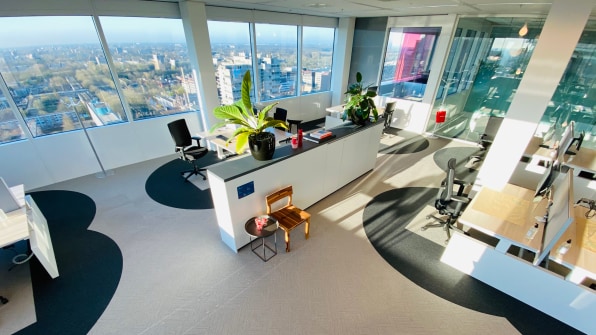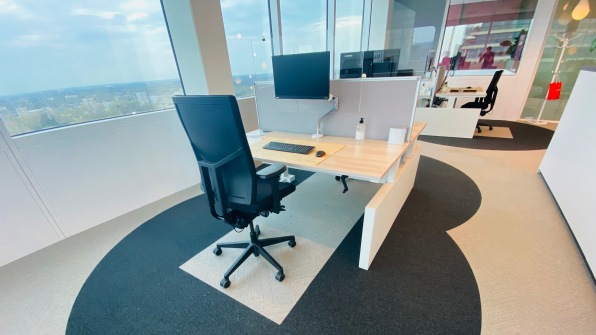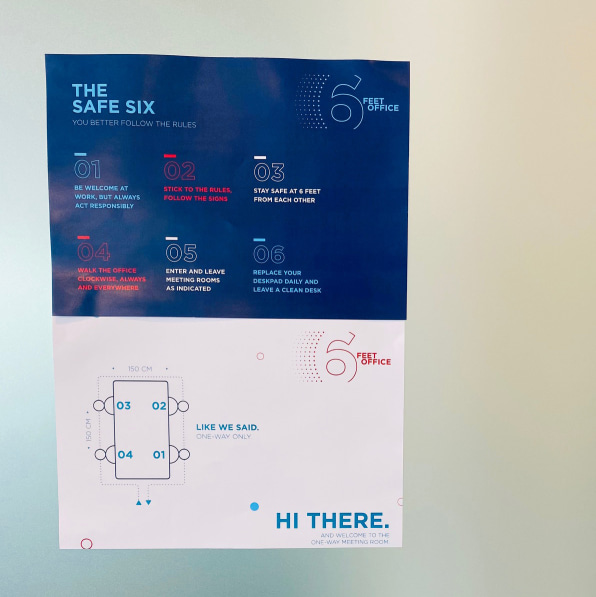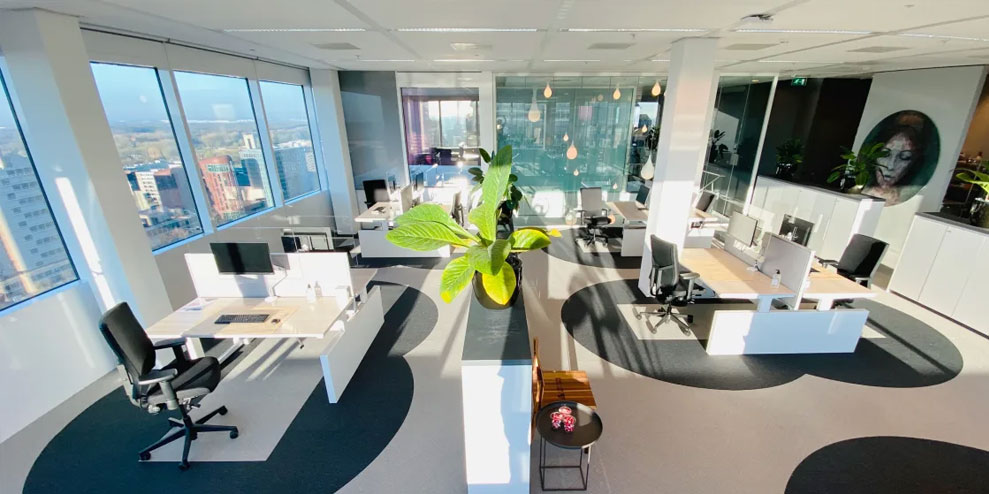Eventually we will have to go back to our offices. But how will work… work?
It’s hard to imagine now—as most of us are reading this in quarantine, with our feet propped on Costco boxes of spaghetti noodles—but we will one day have to go back to our offices. COVID-19 won’t be eradicated, and not everyone will be immune. But we’ll still be expected to sit at a desk and work. So how will work…work?
That’s the question that commercial real estate company Cushman & Wakefield is answering already, because in the past month, the company has helped 10,000 organizations in China move nearly one million people back to work. Using learnings gathered in China, along with World Health Organization data and the advice of medical specialists, the firm developed a new concept inside its own Amsterdam headquarters dubbed the Six Feet Office. It’s both a working laboratory and a showroom for the firm’s clients meant to call attention to how people might safely go back to work in offices (which is, of course, in Cushman & Wakefield’s financial interest).

Jeroen Lokerse, head of Cushman & Wakefield in the Netherlands, led a rapid, one-week redesign of the company’s own office space to encourage better hygiene and social distancing. The core premise is to ensure that six feet, the recommended measurement for safe social distancing, stays between people at all times. This behavior is encouraged through properly spaced desks, but also visual signals, such as a circle embedded in the carpeting around each desk to ensure people don’t get too close.
“[We’re] using design to nudge behavior,” says Despina Katsikakis, head of Occupier Business Performance at Cushman & Wakefield. “And part of this is, how we shift very ingrained behaviors and expectations of how we work.”
Using arrows on the floor, people are also encouraged to walk clockwise, and only clockwise, in lanes around the office. This one-way traffic is the same approach that healthcare workers take in hospitals to help avoid the spread of pathogens.
Each morning, employees are also asked to grab a paper placemat for their desk. At the end of the day, the paper is thrown away, which could help mitigate some contact-based spread of COVID-19 on office surfaces.
Cushman & Wakefield is even installing beacons into its office, which track the movements of employees throughout the space via their phones. Those beacons will be a way for the company to audit the efficacy of its own design—did people get too close or not?—and they may be used to audibly alert people when they break the invisible six-foot barrier. (Yes, to anyone who works outside an office management company, this sounds extremely invasive.)

But is it enough? (No.)
While these ideas do hold some promise, the question remains whether or not a six-foot buffer really is enough to prevent the spread of a virus as contagious as COVID-19. The virus can live on surfaces for days at a time, and it can float for three hours in the air, waiting to infect people who breathe it in. Through that lens, the efforts to keep people separated may help for a brief encounter, but they probably don’t go far enough in spaces that many human bodies are sharing for eight or more hours at a time—especially spaces that are as notoriously poorly ventilated as office buildings. Most office HVAC systems don’t bring in much, if any, fresh air. Instead, they recirculate what’s already inside, which is a mix of carbon dioxide from our exhalations, chemicals that off-gassed from building and decorating materials, and, of course, airborne pathogens. (Studies for indoor air quality get 100 times less funding than outdoor air, which is why you might not have heard much about this.)
Cushman & Wakefield agrees. “Improved air filtration is probably the single most important lesson learned from China,” says Katsikakis. One reason that the labor force has returned to work so quickly is that China’s office buildings have been installing high-end air filtration systems for several years now, and the country even introduced its own indoor air certification standard, in response to rising pollution. (Many offices are also running in rotational shifts, to keep the number of people in an office at once to a minimum.)
Katsikakis imagines that COVID-19 will cause many companies to acquire extra air filtration solutions in the short term in an effort to promote healthier air. Longer term, businesses and landlords may “design buildings that plan for higher quality clean air as the norm,” says Katsikakis. “I think we’re going to see a lot of that.”

Indeed, the team at Cushman & Wakefield believes COVID-19 has fast-forwarded the future of work by as much as a decade, as telecommuting and Zoom meetings with kids screaming in the background became a standard practice overnight. And now, the virus looks poised to bring to light the oft-ignored dangers of recirculated office air. As employees prove their competence working remotely, they will only grow less tolerant of workplaces that fail to promote health and wellbeing.“I think what we’re going to see, which is really interesting, is we have now experienced a work-life integration which will change our perspectives and expectations of how we work in the future,” says Katsikakis. “I think as human beings, we’ll still want to have connections. When we’re in the office, we’ll want to be in a safe environment.”
–
This article first appeared in www.fastcompany.com
Seeking to build and grow your brand using the force of consumer insight, strategic foresight, creative disruption and technology prowess? Talk to us at +9714 3867728 or mail: info@groupisd.com or visit www.groupisd.com

